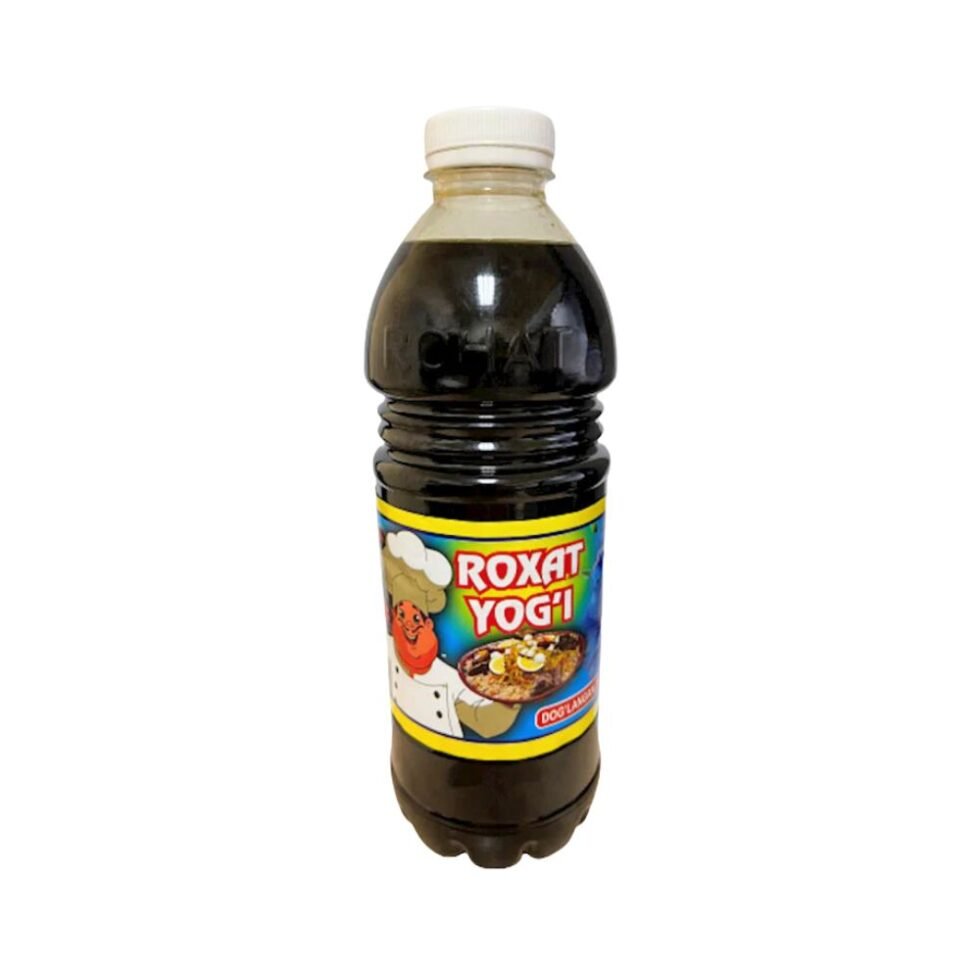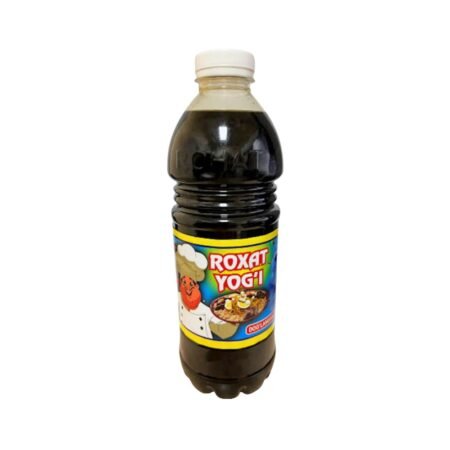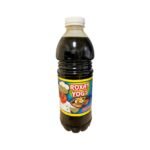super campaigns
Get a surprise discount by registering at
Halal Snacks World!
Join our Halal email subscription now to get updates on promotions and coupons.

Top picks this week. Up to 15% off the best selling products.

Rohat Yog’i Zigir Sesame is a distinguished product in the world of sesame oils, known for its exceptional quality Rohat and numerous health benefits. This premium Rohat sesame oil is meticulously extracted to retain its natural goodness, making it a preferred choice among health enthusiasts and culinary experts alike.
What sets Rohat Yog’i Zigir Sesame apart from other sesame oils is its unparalleled quality and purity. The sesame seeds used in producing this oil are carefully selected and sourced from the finest farms. The extraction process is carried out under stringent conditions to ensure that all the nutritional properties of the sesame seeds are preserved. As a result, the oil is rich in essential nutrients, including antioxidants, vitamins, and minerals.
The health benefits of Rohat Yog’i Zigir Sesame are extensive. This oil is known for its ability to support cardiovascular health, thanks to its high content of monounsaturated and polyunsaturated fats. Additionally, it possesses anti-inflammatory properties, which can help reduce inflammation in the body. Regular consumption of this oil can also enhance skin and hair health, making it a versatile addition to your daily wellness routine.
Rohat Yog’i Zigir Sesame is not only beneficial for health but also adds a delightful flavor to various dishes. Its nutty and aromatic profile makes it an excellent choice for Rohat salad dressings, marinades, and stir-fries. The oil can also be used for sautéing and baking, offering a unique twist to your culinary creations.
In conclusion, Rohat Yog’i Zigir Sesame stands out as a superior sesame oil that delivers both health benefits and culinary versatility. Whether you are looking to enhance your overall wellness or elevate your cooking, this premium sesame oil is an excellent choice. Experience the remarkable quality of Rohat Yog’i Zigir Sesame and make it a staple in your kitchen.

Rohat Yog’i, commonly known as sesame oil, is a versatile and ancient oil that has held significant cultural and practical value Rohat across various regions, particularly in Asia and the Middle East. This oil is extracted from sesame seeds, which are among the oldest cultivated crops known to humanity. Historical records trace the use of sesame seeds and their oil back to ancient civilizations, including Mesopotamia, where it was revered for its medicinal and culinary properties.
In the rich tapestry of cultural traditions, sesame oil has been an essential Rohat component. In ancient Ayurvedic practices, it was often used for its Rohat healing properties, believed to balance the body’s doshas and promote overall well-being. Similarly, in Traditional Chinese Medicine, sesame oil has been utilized for its warming and lubricating qualities, aiding in various treatments. These practices underscore the oil’s longstanding significance in health and wellness routines.
Beyond its medicinal applications, sesame oil has also played a crucial role in culinary traditions. In Middle Eastern cuisine, it is a key ingredient in dishes Rohat like hummus and baba ghanoush, adding a distinctive nutty flavor. Asian cuisines, particularly those of Japan, China, and Korea, frequently use sesame oil to enhance the taste and aroma of various dishes. The oil’s versatility in cooking is partly due to its different forms: toasted and untoasted sesame oil. Toasted sesame oil, known for its rich, deep flavor, is often used as a finishing oil or for dressings. In contrast, untoasted sesame oil, with a lighter taste, is more suitable for cooking and frying.
Understanding the origins, historical significance, and different types of sesame oil provides a solid foundation for appreciating its various benefits and applications. Whether Rohat used for its health benefits, culinary versatility, or cultural importance, Rohat Yog’i continues to be a valuable and cherished oil in many traditions around the world.
Sesame oil, also known as “Rohat Yog’i,” stands out for its rich nutritional profile, making it a valuable addition to a balanced diet. This oil is primarily composed of healthy fats, including a significant amount of polyunsaturated and monounsaturated fats. These fats are known for their beneficial effects on heart health, as they can help reduce levels of bad cholesterol (LDL) and increase good cholesterol (HDL).
One of the key components of sesame oil is its high content of Vitamin E, a potent antioxidant that plays a crucial role in protecting cells from oxidative stress. Vitamin E supports skin health, enhances immune function, and may lower the risk of heart disease. Moreover, sesame oil is rich in other antioxidants, particularly lignans, such as sesamin and sesamolin. These compounds have been shown to exhibit anti-inflammatory and anti-cancer properties, contributing to overall well-being.
Sesame oil also contains a variety of essential vitamins and minerals. It is a good source of Vitamin K, which is vital for blood clotting and bone health. Additionally, the presence of B vitamins, including B1 (thiamine), B2 (riboflavin), and B3 (niacin), supports energy production and proper nervous system function.
Minerals found in sesame oil, such as copper, calcium, magnesium, and zinc, further enhance its nutritional value. Copper plays a role in maintaining healthy blood vessels, nerves, and immune function. Calcium and magnesium are essential for bone health and muscle function, while zinc supports immune health and wound healing.
Incorporating sesame oil into your diet can thus provide a range of health benefits, from improved heart health and immune function to enhanced skin health and antioxidant protection. Its rich nutritional profile makes it a versatile and valuable ingredient for those looking to enhance their overall well-being.
Sesame oil, derived from the seeds of the Sesamum indicum plant, offers a plethora of health benefits, making it a valuable addition to any wellness regimen. Known for its potent anti-inflammatory properties, sesame oil plays a crucial role in reducing inflammation throughout the body. This is particularly beneficial for individuals suffering from chronic inflammatory conditions, such as arthritis. By incorporating sesame oil into their diet or applying it topically, they may experience a significant alleviation of symptoms and improved joint health.
Heart health is another area where sesame oil can have a profound impact. Rich in polyunsaturated and monounsaturated fats, sesame oil helps in maintaining healthy cholesterol levels. Studies indicate that regular consumption of sesame oil can lead to a reduction in LDL cholesterol and an increase in HDL cholesterol, thereby promoting cardiovascular health. Additionally, the presence of antioxidants like sesamol and sesamin in sesame oil aids in protecting the heart from oxidative stress and reduces the risk of atherosclerosis.
Moreover, sesame oil has been found to help in lowering blood pressure. The high content of magnesium in the oil contributes to this effect, making it a useful dietary addition for those managing hypertension. By helping to relax blood vessels, sesame oil can support overall circulatory health.
Beyond cardiovascular benefits, sesame oil also enhances skin health. It contains vitamin E, an antioxidant that helps protect skin cells from damage caused by free radicals. Regular application of sesame oil can improve skin elasticity, reduce the appearance of age spots, and provide deep hydration, making it an excellent natural moisturizer.
Another noteworthy benefit of sesame oil is its role in oral health, particularly through the ancient practice of oil pulling. Swishing sesame oil in the mouth for several minutes can help reduce dental plaque, eliminate harmful bacteria, and promote overall oral hygiene.
In summary, sesame oil is not only a versatile culinary ingredient but also a powerful ally in promoting overall health and wellness. Whether it’s reducing inflammation, supporting heart health, improving skin condition, or boosting oral hygiene, the benefits of sesame oil are both extensive and impressive.
Sesame oil, known for its rich and nutty flavor, is a staple in various culinary traditions, particularly in Asian cuisine. Its versatility makes it a valuable ingredient in a wide array of dishes, from stir-fries to marinades, salad dressings, and sauces. The distinct flavors of toasted and untoasted sesame oil offer unique culinary experiences, each suitable for different types of cooking.
Toasted sesame oil, with its deep, robust flavor, is ideal for adding a finishing touch to dishes. It is typically used in smaller quantities due to its intense taste. This variety of sesame oil shines in recipes such as Asian stir-fries, where just a drizzle can elevate the dish’s flavor profile. Popular recipes include sesame chicken stir-fry and sesame vegetable stir-fry, where the oil’s nutty aroma complements the ingredients perfectly.
Marinades also benefit greatly from the inclusion of toasted sesame oil. It infuses meats and vegetables with a rich, savory flavor that enhances the overall taste. A classic example is a sesame ginger marinade, which combines soy sauce, ginger, garlic, and toasted sesame oil to create a flavorful base for chicken or beef.
For salad dressings, both toasted and untoasted sesame oil can be used, depending on the desired flavor intensity. A toasted sesame oil vinaigrette, made with rice vinegar, soy sauce, and a touch of honey, pairs wonderfully with mixed greens and Asian-inspired salads. On the other hand, untoasted sesame oil offers a milder, more subtle flavor, making it suitable for lighter dressings and sauces.
In sauces, sesame oil provides a distinctive taste that enhances the dish without overpowering it. For instance, a simple sesame dipping sauce, combining sesame oil, soy sauce, and a hint of chili paste, is a perfect accompaniment for dumplings or spring rolls. Additionally, sesame oil can be used in noodle dishes like sesame noodles, where its nutty essence harmonizes with ingredients such as peanut butter, soy sauce, and garlic.
Understanding the differences between toasted and untoasted sesame oil is crucial for maximizing its culinary potential. Toasted sesame oil is best used as a finishing oil or in recipes where a strong, nutty flavor is desired. In contrast, untoasted sesame oil, with its lighter taste, is more versatile and can be used in cooking without overwhelming the dish’s other flavors. Whether you’re preparing a savory stir-fry, a flavorful marinade, or a delicate salad dressing, sesame oil offers a unique and delicious touch to any recipe.
Sesame oil, known for its numerous health benefits, has also carved a niche in the beauty and skincare industry. This versatile oil is celebrated for its moisturizing properties and its ability to nourish and protect the skin, making it an essential ingredient in many cosmetic products.
One of the primary benefits of sesame oil in skincare is its exceptional moisturizing capabilities. Rich in essential fatty acids like linoleic acid and oleic acid, sesame oil penetrates deep into the skin, providing long-lasting hydration. This makes it particularly beneficial for individuals with dry or sensitive skin. Its emollient properties help to soften and smooth the skin, reducing the appearance of fine lines and wrinkles.
Sesame oil is also packed with antioxidants, such as vitamin E and sesamol, which protect the skin from environmental damage and premature aging. These antioxidants help neutralize free radicals, reducing oxidative stress and promoting a youthful complexion. Additionally, sesame oil’s anti-inflammatory properties can soothe irritated skin, making it suitable for conditions like eczema and psoriasis.
For those who prefer natural skincare solutions, sesame oil can be easily incorporated into DIY recipes. A simple yet effective facial oil can be made by mixing a few drops of sesame oil with essential oils like lavender or tea tree oil. This blend not only moisturizes but also provides antibacterial benefits. For a nourishing body lotion, combine sesame oil with shea butter and a few drops of your favorite essential oil. This homemade lotion will keep your skin soft and hydrated throughout the day.
Sesame oil is also beneficial for hair care. It can be used as a pre-shampoo treatment to nourish and strengthen hair strands. Simply warm a small amount of sesame oil and massage it into your scalp and hair. Leave it on for about 30 minutes before washing it off with your regular shampoo. This treatment helps to combat dryness and frizz, leaving your hair shiny and healthy.
In the realm of cosmetics, sesame oil’s versatility and beneficial properties make it a valuable ingredient. Whether used in commercial products or homemade recipes, it offers a natural way to enhance the health and appearance of both skin and hair.
Sesame oil, known for its rich history and myriad of applications, occupies a prominent place in traditional and medicinal practices across diverse cultures. In Ayurvedic medicine, sesame oil is revered for its therapeutic properties. It serves as a staple in Ayurvedic massage therapy, commonly referred to as Abhyanga. This practice involves the application of warm sesame oil to the body, promoting relaxation, improving circulation, and nourishing the skin. Additionally, sesame oil is often used as a base for various herbal remedies in Ayurveda. It acts as a carrier oil, enhancing the absorption of the medicinal properties of herbs into the body.
Beyond Ayurveda, sesame oil also holds a significant position in Chinese medicine. Traditional Chinese medicine practitioners utilize sesame oil for its warming and lubricating qualities. It is frequently incorporated into formulations designed to treat dry skin, improve joint health, and alleviate symptoms of chronic conditions such as arthritis. The oil’s anti-inflammatory and antioxidant properties make it a valuable ingredient in traditional health practices aimed at balancing the body’s energies and promoting overall well-being.
In various folk remedies, sesame oil is celebrated for its versatility and effectiveness. It has been traditionally used to treat minor wounds, burns, and skin irritations, thanks to its natural healing properties. The oil’s antibacterial and antiviral qualities further contribute to its use in addressing common ailments. For instance, in some cultures, sesame oil is applied to the scalp to combat dandruff and promote hair health, while in others, it is used in oral health practices such as oil pulling to maintain oral hygiene and detoxify the body.
Overall, the traditional and medicinal uses of sesame oil underscore its enduring value across different healing traditions. Its ability to support physical health, alleviate discomfort, and enhance natural beauty highlights its multifaceted nature and continued relevance in contemporary wellness practices.
In the context of sesame oil production, environmental and sustainability considerations are paramount. Sesame oil, derived from sesame seeds, can have a significant environmental footprint if not managed responsibly. The cultivation of sesame seeds, particularly in regions like India, China, and Myanmar, often involves extensive land use, water consumption, and pesticide application. However, adopting sustainable farming practices can mitigate these impacts substantially.
Sustainable farming practices for sesame cultivation include crop rotation, organic farming, and integrated pest management. Crop rotation helps maintain soil health and reduces the need for chemical fertilizers, while organic farming eliminates the usage of synthetic pesticides and herbicides, promoting biodiversity. Integrated pest management combines different agricultural practices to control pests in an environmentally friendly manner, reducing chemical dependency.
Consumers play a crucial role in supporting sustainable sesame oil production. One effective way to ensure you are purchasing eco-friendly sesame oil is to look for certifications and labels Rohat that indicate sustainable sourcing. Certifications such as Fair Trade, USDA Organic, and Rainforest Alliance can provide assurance that the sesame oil has been produced under ethical and environmentally responsible conditions. These certifications often cover aspects such as fair wages for farmers, environmentally sound farming practices, and the absence of harmful chemicals.
When choosing sesame oil, it is advisable to research the brands and their sourcing practices. Opt for oils that clearly state their commitment to sustainability on their packaging or website. Additionally, supporting local producers who follow sustainable practices can reduce the carbon footprint associated with transportation and logistics. As consumers become more aware of the environmental impacts of their choices, the demand for sustainably sourced sesame oil is likely to increase, encouraging more producers to adopt greener practices.
By making informed decisions and supporting ethical producers, consumers can contribute to a more sustainable sesame oil industry, ultimately Rohat benefiting both the environment and the communities involved in its production.
In summary, sesame oil, also known as rohat yog’i, offers a multitude of benefits that span culinary, cosmetic, and medicinal realms. This versatile Rohat oil is celebrated for its rich nutrient profile, containing essential fatty acids, antioxidants, and vitamins that contribute to overall health and well-being. In the kitchen, sesame oil enhances the flavor of various dishes with its nutty aroma, making it a staple in many culinary traditions. Additionally, its moisturizing and anti-inflammatory properties make it a valuable ingredient in skincare and haircare routines. Medicinally, sesame oil has been used for centuries in traditional medicine to alleviate ailments and support holistic health.
To incorporate sesame oil into your daily life, start by experimenting with different culinary applications. Use it as a base for stir-fries, salad dressings, or marinades to add a unique depth of flavor to your meals. When it comes to cosmetics, consider using sesame oil as a natural moisturizer for your skin or as a nourishing treatment for your hair. You can also explore its benefits in oil pulling, an ancient practice for oral hygiene that involves swishing sesame oil in your mouth to reduce bacteria and promote dental health.
Experimenting with sesame oil can lead to discovering new and enjoyable ways to enhance your lifestyle. Whether you are cooking a delicious meal, pampering your skin, or seeking natural remedies, sesame oil has proven to be a versatile and beneficial addition. We encourage you to share your own experiences and recipes involving sesame oil, as your insights and creativity can inspire others to explore the many advantages of this remarkable oil.
Feel free to leave a comment below with your favorite uses of sesame oil, and join our community in celebrating the numerous benefits that rohat yog’i has to offer. Your contributions help foster a shared knowledge base, enriching our collective understanding and appreciation of this ancient, yet ever-relevant, natural resource.
Ask a question
Your question will be answered by a store representative or other customers.
Thank you for the question!
Your question has been received and will be answered soon. Please do not submit the same question again.
Error
An error occurred when saving your question. Please report it to the website administrator. Additional information:
Add an answer
Thank you for the answer!
Your answer has been received and will be published soon. Please do not submit the same answer again.
Error
An error occurred when saving your answer. Please report it to the website administrator. Additional information:
Join our Halal email subscription now to get updates on promotions and coupons.

